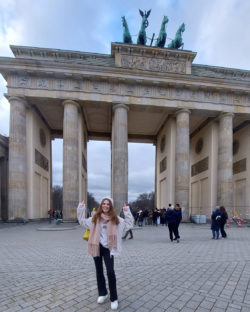Amelia Craik, School of Languages, Cultures and Societies
Amelia Craik, School of Languages, Cultures and Societies
Memory Culture in Germany: The Berlin Dokumentationszentrum: Flucht, Vertreibung, Versöhnung as a case study in how historical narratives can be exploited
My dissertation explores the “re-defining of German self-understanding” (Pawel Lutomski) through the discourse which has arisen surrounding the over twenty year project of a museum in Berlin commemorating the German expellees which finally opened in June last year. The project has been controversial since it’s inception as it represents the way in which commemoration/historical narratives function as a political tool which paradoxically work to perpetuate the myth of Germany as an ‘Opferland’ (country of victims) in a post-reunification context and thereby omitting/eclipsing its role as a ‘Täterland’ (country of perpetrators). Utilising Janet Marstine’s ‘New Museum Theory’, the project explores the way in which the museum is simultaneously a negative and positive example of the German ‘Vergangenheitsbewältigung’ policy (overcoming the past) implemented in official educational and cultural institutions. Since the project’s inception there has been a wide-ranging discourse surrounding the vision for a museum commemorating Germany’s ‘Heimatvertriebene’ ranging from its controversial leadership under Erika Steinbach (affiliated with the AfD), the threat to German-Polish and German-Czech relations and how this narrative can co-exist with the events of the Holocaust.
 BA History & German, Final Year (she/her)
BA History & German, Final Year (she/her)
